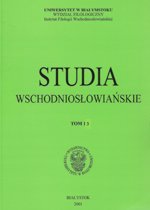Лингвистический анализ грузинского перевода повести Н.В. Гоголя Тарас Бульба
Linguistic analysis of the Georgian translation novel N. Gogol Taras Bulba
Author(s): Manana MikadzeSubject(s): Language and Literature Studies, Literary Texts, Studies of Literature, Translation Studies
Published by: Wydawnictwo Uniwersytetu w Białymstoku
Keywords: грузинский перевод; Гоголь; Тарас Бульба; литературный анализ; рассказ Гоголя; герой рассказа "Тарас Бульба"; язык писателя
Summary/Abstract: Translation, as the act of interlinguistic and cross-cultural communication, is of greatest social importance. This kind of importance has always been in the centre of attention. A lot of different ideas have been expressed in recently published special researches. For some researches the most important point while doing a translation is a good knowledge of literature, for some, on the other hand linguistic methods seem to be valuable. G. Gachechiladze claims that the most important factor of translation is aesthetic values of the original text. We consider both of them are of vital importance. Though they are closely linked with each other they can also be separated. We might face some difficulties while rendering the text from one language into another. Georgian translation in its own way is an original due to its structure and some specific features. The translator should manage to maintain the natural structure of the language and this can only be achieved by preserving the specific grammatical characteristics of the language which seems to be quite difficult. The translator should take into consideration the fact that the language of fiction is based on literary language and when translating it is very important to try to find the emotional equivalents in the target language. "Taras Bulba" by N. Gogol is deservedly considered to be a masterpiece. This short story is the best example of interconnection between the human life and some psychological moments. The reader is under the book’s impression for a long time and that means that it is a valuable work of art. The translator deeply feels the original version of this book and shows his good taste in literature. The translator is not impossible always to have all the readymade materials, phrases and terms, no matter how rich and well-developed the target language is. But it should be mentioned to the translator’s credit that in the translated text the translator uses the natural forms to characterized to the Georgian language. Every translation enriches not only the culture but also the language itself. That’s why in recent years a great attention is drawn to the stylistic analysis of the literary translation. A lot of research works have been dedicated to this matter. That’s the aim of research as well. We consider the translation of "Taras Bulba" to be one of the best translation works ever made and its analysis has confirmed the complexity involved in carrying out this work. In the translation the brilliant knowledge and the adequate use of the expressive festures of the original language are vividly shown.
Journal: Studia Wschodniosłowiańskie
- Issue Year: 2015
- Issue No: 15
- Page Range: 375-381
- Page Count: 7
- Language: Russian

